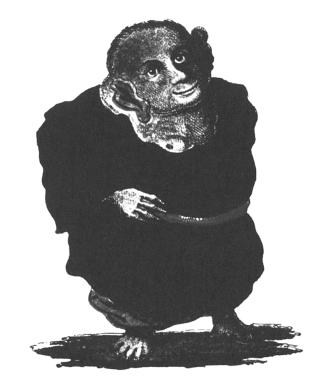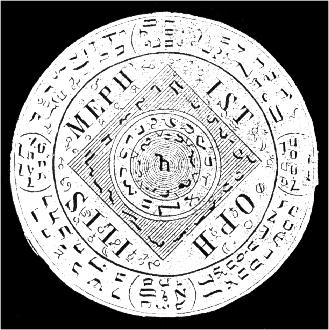

(Mephistopheles)
The most famous demon of all, though not the most revered or most powerful, is Mephistopheles, who is fabled to have to served as familiar demon to the German wandering scholar and magician Georgius Sabillicus Faustus (1480-1540?) as part of Faust's pact with the Devil.
The demon's name has many variant spellings, among them Mephistopheles, Miphostophiles, Mephisto, Mephostophiles and Mephistophilis.
During Faustus lifetime he was known throughout Germany as a fraud and a trickster. The great Abbot Trithemius, who knew as much about real magic as any man alive, referred to Faust in a letter dated 1507, calling him a mountebank who should be whipped. Faust had the audacity to send Trithemius his calling card, which is how we know his full name, but he fled the city rather than meet with Trithemius, who would undoubtedly have denounced him as a fake.
Faust's reputation as a magician swelled in the German literature of magic shortly after his death, when a number of grimoires were attributed to his hand. The earliest popular retelling of the Faust legend, as opposed to the grimoires attributed to Faust, appeared in print in 1587. In this supposedly true history, the first name of Faust was changed from Georgius to Johannus.
Mephistopheles might have remained no more than an obscure footnote in demonology had not the fable of Faust been used by the English playwright Christopher Marlowe (1564-1593) as the subject for his entertaining work The Tragical History of the Life and Death of Dr. Faustus (first recorded performance, 1594). The German poet and playwright Johann Wolfgang von Goethe (1749-1832) further cemented the fame of both Faust and Mephistopheles with his play Faust, which Goethe began to compose in 1773, but which was not published in its complete two-part form until after his death. In both dramas, Mephistopheles is nearly as important a character as Faust himself.
Marlowe's Faust is a great scholar who grows tired of the vanity and impotence of ordinary human knowledge. He decides to turn to magic to fulfill his lust for fame, wealth and power:
Philosophy is odious and obscure;
Both law and physic are for petty wits;
Divinity is basest of the three,
Unpleasant, harsh, contemptible, and vile.
'Tis magic, magic that hath ravished me.
Faust evokes Mephistopheles with a Latin incantation, which is here translated into English (Marlowe spelled the name of the demon Mephostophilis):
May the gods of Acheron be propitious to me. Away with the three-fold godhead of Jehovah. Welcome, spirits of fire, air, water, and earth. We ask your favor, O prince of the East, Belzebub, monarch of burning hell, and Demogorgon, that Mephostophilis may appear and rise. What dost thou delay? By Jehovah, Gehenna, and the holy water which I now sprinkle, and the sign of the cross which I now make, and by our vows, may Mephostophilis himself now rise, commanded by us.
At first Mephistopheles appears in the form of a terrible dragon, but Faust sends him away and commands that he reappear in a more pleasing shape, that of a humble Franciscan friar. The demon does as Faust orders and asks Faust what the scholar would have him do.
Using Mephistopheles as his messenger, Faust sends the following promise to Lucifer, the lord of the demon in Marlowe's version of the legend:
Go bear these tidings to great Lucifer:
Seeing Faustus hath incurred eternal death,
By desperate thoughts against Jove's deity,
Say he surrenders up to him his soul,
So he will spare him four and twenty years,
Letting him live in all voluptuousness,
Having thee ever to attend on me,
To give me whatsoever I shall ask;
To tell me whatsoever I demand;
To slay mine enemies, and aid my friends,
And always be obedient to my will.
Mephisto returns with the news that Lucifer has accepted Faust's bargain, but first Faust must draw up a formal deed agreeing to give over to Lucifer his soul at the end of the term of the agreement. This is the infamous black pact that forms the centerpiece, either explicitly or implicitly, of all versions of the Faust legend. Mephistopheles declares:
But now thou must bequeath it solemnly,
And write a deed of gift with thine own blood,
For that security craves Lucifer.
In this manner Mephistopheles becomes the demonic familiar servant of Faust in the guise of a Gray Friar -- that is to say, a Franciscan monk. There is an interesting exchange between Faust and Mephisto early in their relationship when Faust asks the demon how he is able to walk the surface of the earth, since he is one of the damned in hell:
Faust: How comes it then that thou art out of hell?
Mephisto: Why, this is hell, nor am I out of it.
This is a rather neat explanation as to how Satan and his minions can appear in the world of humanity from time to time -- our universe is merely an extension of hell, a subdivision if you will.
Goethe's Faust is a more noble and more heroic figure than Marlowe's protagonist. He turns to magic seeking true knowledge, not luxury and power. In a book supposedly by the French seer Nostradamus he sees an image of the Macrocosm and his soul is ravished and empowered by it. He calls up the Spirit of the World but the nature of the spirit is too pure and potent for Faust to endure. It vanishes.
Later that day while out walking Faust is followed by a black poodle that fawns on him and crawls on its belly seeking favor from the magician. Faust takes the strange dog home, where it transforms itself first into a fearsome beast like a hippopotamus, then when Faust attempts to bind it with a spell, into a form that resembles an elephant, and finally into a mild, obsequious vagabond scholar.
When Mephistopheles appears to Faust a second time, he is dressed as a young nobleman in a red doublet trimmed with gold, with a stiff silk cloak, a cock's feather in his hat, wearing at his side a long sword. This is how the demon is usually represented in modern illustrations, which draw their inspiration from Goethe's play.
Goethe's Mephistopheles is very clever with words, smooth in his manner, sly, deceitful, flattering -- a likeable rogue who is not to be trusted, but nevertheless is good company.
Before he appears as a monk, Mephistopheles goes through a series of frightening forms, as suggested by Marlowe in his play. In Magiae naturalis et innatural the author, who presents himself as the historical Faust, writes:
This hellish Grand-Duke Mephistoph. appeared to me, Faust, first at a cross-road, and in a very cruel guise, like a bear, then mannerly like a lion; but through much persistence in my conjurations I managed to get him to promise to come to my study, and he came in the form of an old grey man. This spirit immediately made a pact with me for twenty-four years, and promised to bring me quick as thought to any place. Also I was to learn from him all the secret arts of nigromancy, and he promised to teach me magic properly. He also said: 'All secret arts of nature lie hidden in me. I govern in the hour of Jupiter; therefore I am very much attached to man, and warn him against making pacts. But if he will not heed my warning, then he will find no mercy from me when his hour strikes; nor would the star of Lucifer my Principal which is called Cerumepihiton and hardens the heart of men, allow it. I am most friendly when I appear as a grey man.'
In another of the early German Faust grimoires, known as Faustbooks, Faust evokes Mephistopheles in the depths of a forest. A great wind arises that presses the trees almost flat to the ground and roars around the outer edge of the magic circle that protects the magician with the fury of a thousand roaring lions, like a thousand wagons running together over paving stones. Thunder and lightning crashes from the four corners of the world. Suddenly above the head of Faust a great dragon materializes -- this is evidently the dragon mentioned in Marlowe's play. The dragon is replaced by a flame that falls like a lightning bolt. This flame changes to a globe, out of which comes a burning humanoid figure who runs swiftly around the outer edge of the circle, then changes into a Gray Friar and asked Faust what he wants.

(seal of Mephistopheles from a German grimoire)
The seal of Mephistopheles above was published in a German grimoire, and reprinted by J. Scheible in his twelve volume anthology of occult works Das Kloster in 1846. It was reproduced by Butler in her book Ritual Magic (Plate VII). It is the same seal that appears in The Sixth and Seventh Books of Moses, where it is shown greatly corrupted by the carelessness of copyists.
Service After The Sell
"Guaranteed"
AVAILABLE 24-7 TO BETTER SERVE YOU
1-727-216-9750
New Supplies Store Coming Soon!!!

General information about spell
casting below.
Having trouble with the site? e-mail Admin at admin@lovespells-magicspells.com